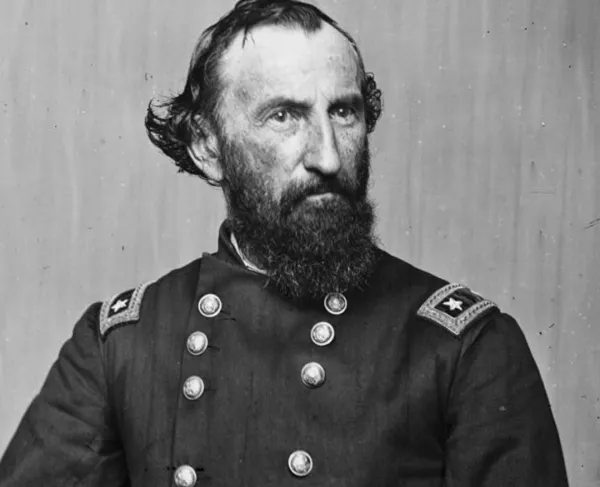John A. McClernand

Yet another prominent Illinoian who played a role in the Civil War, John Alexander McClernand was born in Breckinridge County, Kentucky, before moving to Shawneetown, Illinois, at a young age. Similar to fellow Illinoian Abraham Lincoln, McClernand was a largely self-taught lawyer, who began practicing in Shawneetown in 1835. Also like Lincoln, McClernand served in the Black Hawk War.
However, McClernand was a staunch Democrat. In 1835, he established the newspaper Shawneetown Democrat. He was active in Democratic politics at both the state and federal level, serving in the Illinois House of Representatives and eventually Congress. In Congress, McClernand was a stalwart Jacksonian Democrat who strongly disliked abolitionists. He strongly opposed the Wilmot Proviso, which banned slavery in the territory gained after the Mexican-American War. He became a key ally of fellow Democrat and Illinoian Stephen A. Douglas, helping him pass the Compromise of 1850. As tensions rose approaching the election of 1860, McClernand campaigned for Douglas’s presidency and became a Unionist. After war broke out in the following April, McClernand helped raise volunteers for the Union Army. Because Lincoln needed to retain a wide base of support and retain connections with Democrats in Illinois, he appointed McClernand a brigadier general on May 17, 1861.
McClernand’s military career would be defined by an ongoing clash with fellow Illinoian General Ulysses S. Grant. Grant, a seasoned West Pointer who served in Mexico, was irritated by McClernand, a political general with little military experience. Further exacerbating relations was McClernand’s tendency to boast about his exploits and diminish the achievements of other commanders.
Their working relationship began in June 1861, when Grant asked McClernand to deliver a speech to soldiers of the 21st Illinois regiment. However, their relationship soon soured at the Battle of Belmont in November 1861. There, during what seemed like a total Union victory, McClernand’s men lost their discipline and began looting abandoned Confederate camps while McClernand himself gave a victory speech, allowing the Confederates to counterattack and turn the victory into more of a defeat.
Despite this, McClernand was given command of a division. At the Battle of Fort Donelson, after not properly anchoring his flank, McClernand’s men were driven back for almost two miles, before Grant was able to stabilize the line and counterattack and capture the fort. Grant further questioned McClernand’s ability as a commander, especially when McClernand issued a congratulatory order to his men and emphasized their role in the battle at the expense of others.
After Fort Donelson, McClernand was appointed to major general. At the Battle of Shiloh, his division performed well, helping General William T. Sherman’s men hold the Union line. In Grant’s battle report, he didn’t acknowledge McClernand’s actions, to which McClernand took much offense.
McClernand spent a good part of 1862 maneuvering to gain his own command, going straight to Washington without consulting Grant or Union General-in-Chief Henry W. Halleck. Lincoln obliged and allowed him to raise his own troops in Illinois, Indiana, and Iowa for an expedition to take Vicksburg, which was one of the last Confederate strongholds on the Mississippi. Only directly reporting to Halleck, McClernand’s force, along with Sherman, moved into Arkansas and captured Arkansas Post on January 11, 1863, at Sherman’s suggestion. Less than a week later, Grant united his troops with McClernand’s and assumed command of both forces.
McClernand spent the Vicksburg campaign self-aggrandizing and criticizing his superiors, especially Grant. He went as far as to spread vicious rumors about Grant’s drinking and conduct during the campaign, earning him the enmity of senior commanders. During the siege of Vicksburg, McClernand led a bloody but ultimately unsuccessful assault against the entrenchments, after which he once again wrote a congratulatory order to his men that greatly angered Sherman and General James B. McPherson. This order was then published in the newspapers, which broke the rules established by the War Department. This breach of conduct was just what Grant needed to finally remove McClernand from command. McClernand personally wrote Lincoln asking him to rescind the order, but McClernand was not reinstated to his command.
Only in 1864 was McClernand brought back to a field command in the Department of the Gulf, once again a political move by Lincoln to appease War Democrats. Illness caused him to miss out on the Red River Campaign and he ultimately spent much of his time inspecting fortifications on the Rio Grande. McClernand resigned in November 1864, on account of his illness and belief he could serve the Union cause better as a civilian.
Ironically, McClernand played a large role in Lincoln’s funeral. He then served as a district judge in Illinois for three years and subsequently returned to his law practice. Still a prominent figure in Democratic politics, he presided over the Democratic National Convention in 1876. He died on September 20, 1900, at the age of 88.
Related Battles
1,092
4,931





